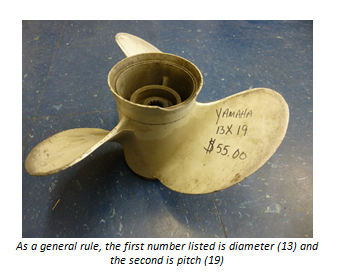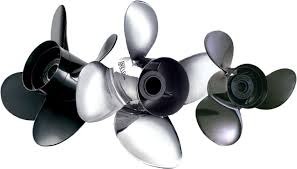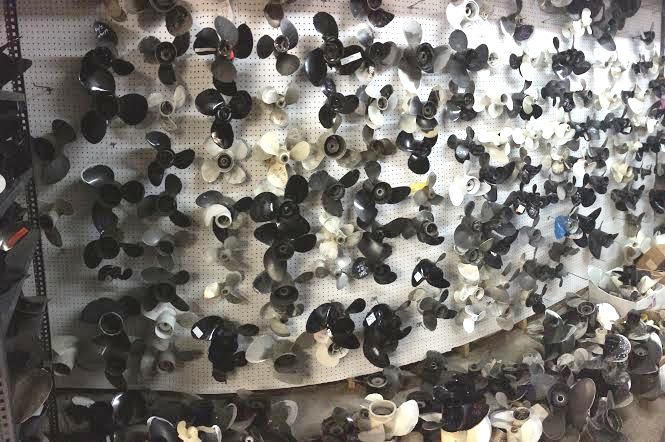Here at Van's, we get a lot of customers looking for propellers, either used or new. Finding the right prop can be crucial to getting the most out of your boat and motor while also avoiding damages. There's a lot of things to consider, but it helps to know what you are looking for and why. Here's a few tips to keep in mind.
1: Don't go big or go home: Find the right pitch and diameter

The first thing to consider when finding a prop is diameter and pitch. Diameter is the distance from the center of the hub to the tip of any blade, doubled. Typically smaller diameter goes with smaller engines and larger goes with larger engines. Pitch refers to the theoretical distance, in inches, that a propeller moves forward in one revolution. When looking for a prop, it's easy to assume the bigger the pitch, the faster, the better. But it's important to make sure your engine can keep up with the pitch--you want to find a pitch that optimizes performance while still staying in the suggested rpm range at wide open throttle (WOT).
High pitch will give optimal performance as long as your engine has enough power to keep up. Not to mention, lower pitch props can have their advantages too: they can increase acceleration and pulling power. Lower pitch provides better hole shot. Using a prop with too much pitch can lead to engine damage and more wear and tear on your motor. Sometimes finding the right pitch is unfortunately a matter of trial and error. A nearby dealer or marina can help you leave with the right pitch. Make sure to come knowing the type of engine, horsepower rating, weight, hull style, and what type of propeller you are currently running.
2: Match your prop to your boating style
Your weekend plans matter. When searching for a prop with the right pitch, it can be helpful to take into consideration what you are using your engine for. Do you want to see what kind of speed you can get? Are you looking to take a slow and steady cruise with friends? Or do you want a pitch with better hole shot to help you look like a watersports pro? It matters.
There will be a couple of different pitches that could be used for your engine. Most of the time there is a prop that best suits your engine and then there will be a prop that best suits your needs and activity. If you do a lot of watersports and aren't too concerned with having top speed at WOT, then you will want to go with a lower pitch. A lower pitch will be able to provide better acceleration and hole shot. Also, if you are willing to give up speed in order to have more friends (weight) on your boat, a lower pitch will also suit you because it can offer better pulling power. On the flip side, if you are a solo speed demon who likes to take fast rides with fewer people, a higher pitch is for you. It may take a little longer for your boat to plane, but you have a higher potential speed at WOT.
3: Decide on a material - Aluminum or Stainless-Steel
Let's start with a clean slate when it comes to what material is better: neither. They each have advantages - different advantages - but they both have them nonetheless.

Aluminum Propellers
Aluminum propellers cost less. That's the biggest advantage, plain and simple. Cheaper price also transfers into getting them fixed; aluminum repairs are often half the price of stainless-steel repairs. Aluminum props also offer a wider range; if you are looking for a specific or specialized propeller you have a good shot of finding it in aluminum. If you're willing to give up a little durability in order to save (more than) a few bucks--aluminum is the way to go.
Stainless-Steel Propellers
Stainless-steel propellers offer better durability and performance. They're less likely to get damaged when bumping into a hard surface. However, when a collision does occur, the damage can sometimes be more server: stainless-steel at times can be too tough, too stubborn. When you collide with something, the blades can refuse to give and the strong force can move into the lower unit, causing damages there. That being said, though, they still provide better performance and durability. The stainless-steel propellers cost more, both to buy and repair, but those extra dollars won't go unnoticed.
 Van's offers a wide variety of propellers: new or used, aluminum or stainless-steel
Van's offers a wide variety of propellers: new or used, aluminum or stainless-steel
It seems daunting, finding the right prop for your engine. But the work and time is worth it. Finding the right prop can assure you are getting the most out of your engine, avoiding costly damages, and altering your boat to best suit you. Don't hesitate to stop in to Van's Sport Center for help in finding the right prop for you--it's what we are here for!

